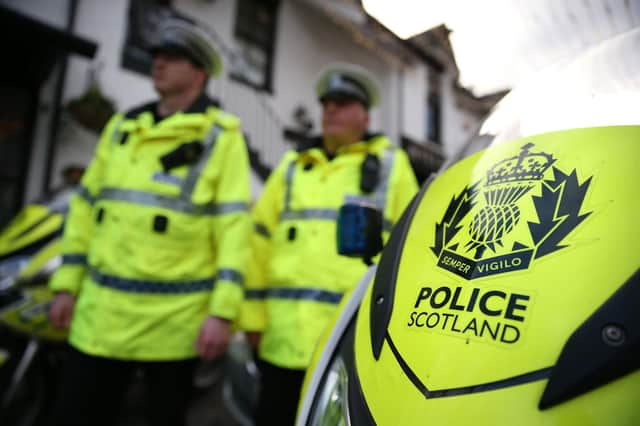Fears recording non-crime 'hate incidents' could hamper job prospects under disclosure checks


Police Scotland’s controversial policy of logging hate incidents that are not crimes has been branded “deeply concerning” after it emerged it could prevent people securing key employment.
Every report of a hate incident that does not meet any criminal threshold, are still logged by Police Scotland, despite a legal challenge south of the Border forcing the abandonment of a similar policy in England and Wales.
Advertisement
Hide AdAdvertisement
Hide AdBut it has now been revealed that the information of someone having a non-crime hate incident logged against them could be included in enhanced checks by Disclosure Scotland for certain jobs like teaching.


Disclosure Scotland confirmed that enhanced checks “may include reference to non-conviction matters” such as non-crime hate incidents while The Scotsman understands information within hate incidents would fall under other relevant information in enhanced checks handed over by Police Scotland.
Critics have claimed that the Hate Crime Act being rolled out from Monday could land Police Scotland with many more non-crime hate incidents to record amid confusion over the new legislation and what constitutes a hate crime.
The law will create new stirring up of hatred offences for protected characteristics including age, disability, religion, sexual orientation and transgender identity. These extra provisions will add to the long-standing stirring up racial hatred offences, which have been in place since 1986. Under the law, offences are considered "aggravated" if they are motivated by prejudice on the basis of set characteristics, which could influence sentencing by judges. Crucially, a criminal act must have occurred for the hate crimes aggravator to be applied.
Disclosure Scotland states that “an enhanced disclosure is used to help employers make sure people are suitable for certain roles”, as well as “to adopt a child” and “for a gaming or lottery licence for your business”.
An enhanced disclosure shows certain information relating to criminal history including unspent convictions, relevant spent convictions, unspent cautions and any inclusion on children’s or adults’ lists if it's relevant to the job.
The advanced disclosure also opens the possibility for “other relevant information held by the police” to be logged. It is understood that information within non-crime hate incidents would fall under “other relevant information”. Police Scotland has suggested it would be unlikely to show up in advanced disclosures as officers attempt to keep the information in a hate incident anonymised where possible.
Despite no comprehensive list of jobs available, it is thought that jobs that involve working with vulnerable groups such as children, the elderly or disabled people as well as jobs that require access to sensitive information like financial or medical records, usually require an enhanced disclosure check.
Advertisement
Hide AdAdvertisement
Hide AdScottish Conservative MSP, Murdo Fraser, has threatened Police Scotland with legal action after he discovered he had been logged after someone complained about a social media post criticising the Scottish Government's transgender policy.
Mr Fraser confirmed to The Scotsman that police had told him his record of a non-crime hate incident was anonymised, but officers were still able to trace it back to him, suggesting some record of the incident against his name exists.
He said: “This revelation from Disclosure Scotland is deeply concerning.
“It’s wrong that people who have not committed a hate crime could still have an ‘incident’ recorded against them by the police, which shows up later through a disclosure check.
“There’s the very real possibility of people missing out on a new job, despite having committed no crime. And, if their experience is anything like mine, they may not even know why, because they had no knowledge of the police ‘incident’ showing up against their name.
“Matters will be made much worse with the new Hate Crime Act which comes into force next week. This could criminalise free speech, is destined for disaster, and should be scrapped immediately.”
SNP MP Joanna Cherry, who has been critical of the hate crime legislation, has said the latest revelation should cause concerns, claiming Police Scotland’s policy of recording all incidents “is clearly unlawful”.
Writing on X, formerly known as Twitter, Ms Cherry added: “This confirmation that the recording of subjective ‘non-crime hate incidents’ could threaten the job prospects of innocent people should silence those suggesting there’s not a problem here.”
Advertisement
Hide AdAdvertisement
Hide AdA Disclosure Scotland spokesperson said: “Enhanced checks include conviction information and may include other relevant information (ORI).
“ORI is police information about the applicant that the Chief Constable reasonably believes is relevant for the purpose of the disclosure (or) that the information ought to be included on the disclosure certificate.
“This may include reference to non-conviction matters. Disclosure Scotland has no discretion about disclosing ORI.”
Police Scotland and the Scottish Government have received criticism for the lack of preparedness for officers to deal with the new legislation being enforced from next week.
Mr Yousaf has told MSPs that police officers are undergoing "a robust package of training" ahead of the Hate Crime Act rolling out on Monday and stressed that the legislation contains "explicit freedom of expression protections" amid concerns raised it is stifling freedom of expression.
Speaking at the Scottish Police Authority board meeting last week, Chief Constable Jo Farrell stressed that officers “balance human rights against individual laws every single day”, adding that “this new Hate Crime Act is no different”.
She added: “What the legislation says and the training reinforces is that somebody’s view, while you might not like it or agree with it, does not become a criminal offence.
“Part of our response as the legislation beds in is to keep obviously close scrutiny in relation to the volume, in relation to type of crime that’s being reported, what are the implications, a quality assurance to our response so that we are applying the legislation appropriately.”